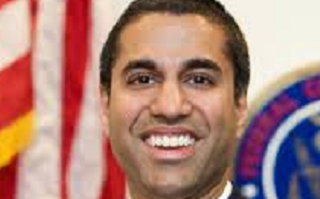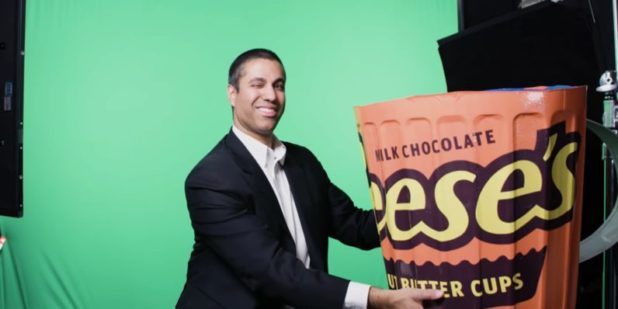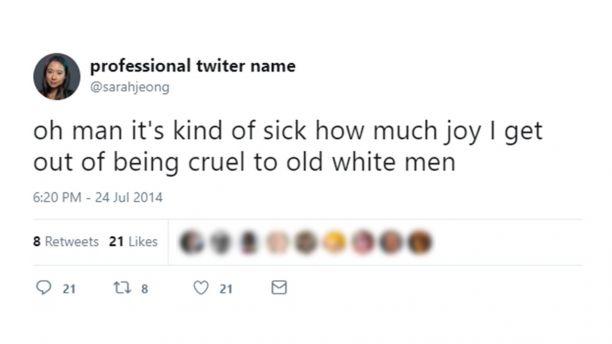Adrian Sol
Daily Stormer
September 5, 2018
Soon, you’re gonna need a cup this big to contain all your freedoms.
The noble Indian leader of the FCC, Ajit Pai, has issued a clear declaration of war against the wretched Jewish social media overlords.
In no uncertain terms, he wrote that social media companies should be held to strict standards of transparency, which is to say that their obscure schemes will be brought to light.
Transparency is to the Jew as light is to the vampires.
The leader of the Federal Communications Commission says that major web companies like Facebook, Twitter, and Google have offered little transparency into how they work — and it’s time to seriously consider forcing them to tell us.
YES.
Bring these kikes to heel!
In a blog post today, FCC chairman Ajit Pai calls out a long list of algorithmic and moderation decisions by web companies (including Twitter choosing not to ban New York Times columnist Sarah Jeong, a former Verge writer) and says that “consumers have virtually no insight” into how or why they happen. The same goes for privacy issues around how and where our data is used, Pai says.
“The public deserves to know more about how these companies operate,” he writes. “And we need to seriously think about whether the time has come for these companies to abide by new transparency obligations.”
Basically, here’s how decisions are probably made at all major social media companies.
The decision is put before a panel consisting of a Jew, a tranny, a fat sheboon and a communist. If any of them is offended by the idea, it’s rejected.
Same goes for bans, post deletions and other forms of censorship.
In other words, it functions exactly like Hollywood.
A. Wyatt Mann is a seer.
Pai’s blog post is timed to a congressional hearing that will see Facebook and Twitter executives sitting in front of a House committee tomorrow to answer questions around transparency. (Google was invited, but declined to appear.) The fact that Pai is even weighing in here is unusual: web companies make great use of the networks his agency regulates, but he does not regulate these web companies.
On top of that, Pai actively fought and stripped away similar regulations on the companies that he does regulate — internet providers. Privacy rules covering the vast amounts of data that your internet provider is capable of seeing were among the first things he scrapped after taking charge of the commission.
More net neutrality whining. We already covered this. It’s complete bullshit – all the people responsible for censorship were in favor of net neutrality, while the net infrastructure companies – who never censored anybody, and can’t legally do so – were against it.
The points Pai makes about tech companies are not altogether wrong. How the algorithms behind major websites work and what’s happening to our data are increasingly considered critical questions, and the demand for transparency is growing.
But Pai comes at it from the same approach as President Trump, cherry-picking examples to make it seem like these are liberal companies out to silence conservative voices, rather than platforms keeping their sites safe.
“Keeping their sites safe.”
Safe from what? Opinions they disagree with?
No one is safe from memes.
Jews, of course, are always characterizing speech they disagree with as “violence.” Conversely, they characterize antifa throwing bricks at people as “freedom of expression.”
One example he pulls out is YouTube demonetizing videos from PragerU, a nonprofit (which is not a university) that the Southern Poverty Law Center described as offering “dog whistles to the extreme right.” Among the videos pulled were several with Islamophobic titles like “Is Islam a Religion of Peace?”
PragerU are such hardcore racists that they had some kind of Somali on to criticize Islam.
It’s actually a totally Jewish organization pushing civic nationalism and support for Israel. But even that’s going too far for the Jews at the SPLC.
Ajit Pai actually presents other, more interesting examples to illustrate social media censorship:
We still don’t know. Recently, for instance, The New York Times hired a left-wing editorial board member who used racially incendiary language in a plethora of tweets. Those tweets remained on the platform until they were deleted by the user, and she was never suspended. Last month, a conservative commentator took some of those same tweets, substituted a religious group for the racial category in order to, she argued, underscore the original tweets’ repugnance — and was promptly suspended.
He’s talking about that bitch Sarah Jeong, of course.
He also mentions how even politicians are getting censored.
And many Twitter users said their online messages were restricted without explanation, such as Tennessee Congresswoman Marsha Blackburn’s video announcing her campaign for the U.S. Senate […].
These examples show that this is being taken very seriously, and Pai’s sentiments are probably in line with Trump’s thinking.
As such, things are looking very good for the future of our internet freedoms.





